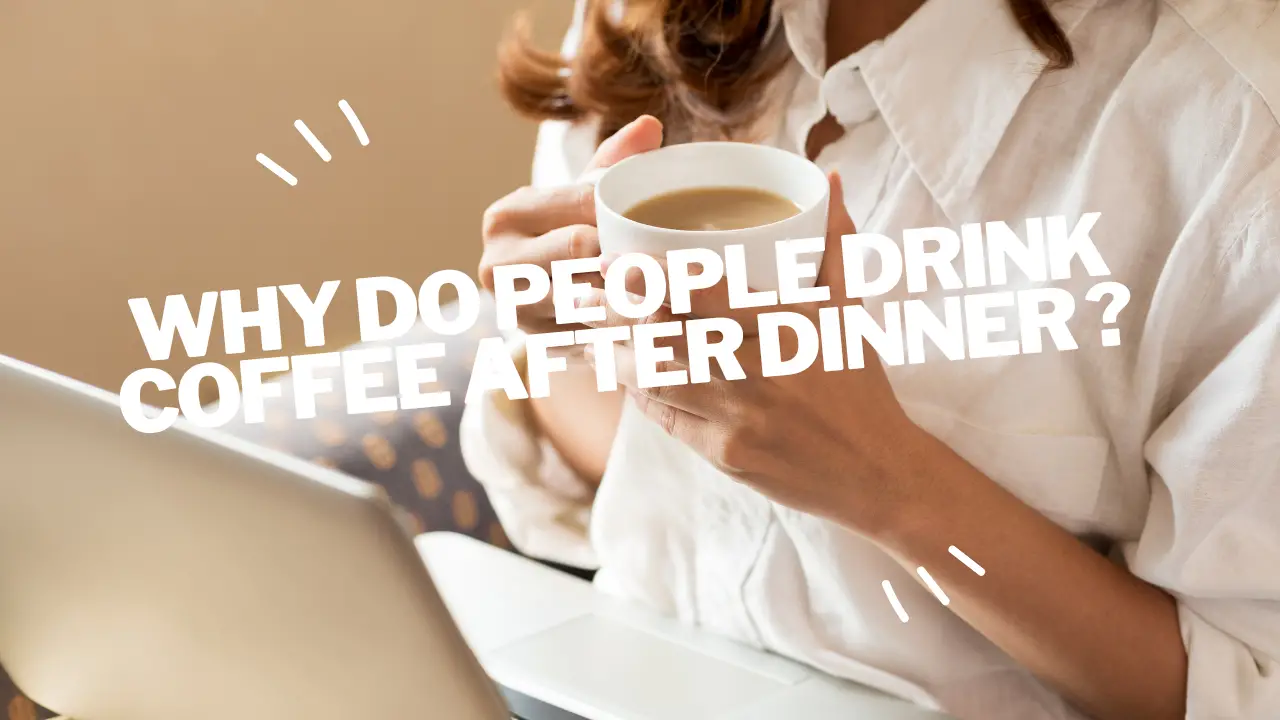Ah, the magical moment when the dinner plates have been whisked away, and the day’s work is finally done. What’s the next step? For many folks, it’s time to reach for that sacred elixir we call coffee. Why on earth do people have a hankering for coffee after dinner, you might ask? Well, dear reader, fear not! In this article, we’ll embark on a journey filled with historical tidbits, cultural quirks, and a dash of science to unravel the enigma behind this peculiar habit. So grab a cup of joe (after dinner, of course) and join us on this wild caffeine-infused adventure!
A Trip Down Memory Lane
To understand the wacky world of post-dinner coffee, we must turn back the clock. Picture this: it’s the fifteenth century, and coffee is making its debut in the Middle East. From there, it spreads like wildfire across continents, gaining popularity faster than a viral cat video. As coffee’s fame grows, it becomes a must-have for social gatherings, including the cherished tradition of sipping it after a satisfying meal. And just like that, sharing a cup of coffee after dinner becomes the hippest thing since bell-bottom pants.
The Cultural Coffee Connection
Coffee after dinner isn’t just a random act—it carries cultural weight in many societies. In countless countries, it’s a symbol of hospitality and a warm invitation to keep the party going. It’s like waving a neon sign that says, “Hey, let’s unwind and enjoy each other’s company!” The ritual of sipping coffee after dinner often comes hand-in-hand with engaging conversations, bonding moments with loved ones, or simply relishing a serene moment of tranquility. It’s like a secret handshake for caffeine enthusiasts.
The Science of Sipping
Now, let’s dive into the bizarre world of science and figure out why our bodies crave coffee after a delicious meal.
A Digestive Delight
One reason people seek refuge in coffee after dinner is its potential to aid digestion. Coffee acts as a stimulant, revving up the production of gastric acid, which helps break down food. And let’s not forget the delightful warmth and subtle bitterness of coffee, providing a sensory experience that cozies up to your taste buds like a soft blanket after a long day.
The Social Stimulator
Coffee has an uncanny ability to enhance social interactions. The act of brewing and sharing a cup of java creates an atmosphere of togetherness and camaraderie. After devouring a scrumptious meal, the coffee-making ritual becomes a delightful group activity, forming connections and bringing people closer together. It’s like a magical potion that fuels friendships and turns acquaintances into BFFs.
Mood-Boosting Magic
Ah, the aroma! The taste! The sheer joy of coffee! It’s enough to put a smile on anyone’s face. Coffee contains caffeine, a natural pick-me-up that boosts alertness and can even improve your mood. After a long day, that post-dinner cup of coffee becomes a mini celebration, waving goodbye to fatigue and embracing relaxation like a bear hug from a friend you haven’t seen in ages.
The Perks and Perils
Now, let’s spill the beans on the benefits and risks of this coffee after dinner tradition. We’ll sprinkle in some advice along the way, just to keep things interesting.
Antioxidant Powerhouse
Coffee is a superhero when it comes to antioxidants. These mighty little compounds protect your body from pesky free radicals, reducing the risk of certain diseases like Parkinson’s, type 2 diabetes, and certain types of cancer. However, like any superhero, coffee should be consumed in moderation. Too much of a good thing can have adverse effects, and we wouldn’t want that, would we?
The Slumber Struggle
Here’s the scoop on sleep. Caffeine, the sneaky ingredient that makes coffee so alluring, can mess with your sleep patterns. If you down a cup of joe right before bed, you might find yourself tossing and turning like a stressed-out dolphin. So, be smart about it—avoid coffee too close to bedtime to ensure a restful slumber and prevent yourself from becoming a nocturnal owl with an excessive caffeine buzz.
Acid Reflux Rumble
If you’re prone to acid reflux, coffee after dinner might not be your best friend. You see, coffee has a mischievous side, known to relax the lower esophageal sphincter, allowing stomach acid to waltz back into the esophagus. This can lead to heartburn and discomfort, especially when you’re ready to snuggle up in bed. So, listen to your body and consider alternative options if coffee gives you that fiery feeling.
The Wacky Alternatives
Are you ready to spice things up and explore some offbeat alternatives to coffee after dinner? Buckle up, because we’re about to venture into the realm of herbal infusions and decaffeinated wonders!
Herbal Hilarity
If you crave a warm, comforting drink without the caffeine jitters, herbal infusions are here to save the day. Chamomile, peppermint, or ginger tea can work wonders for digestion and provide a soothing experience after a belly-busting feast. Plus, they each have their unique flavors and potential health benefits. It’s like a fancy spa day for your taste buds.
Decaf Delights
Love the taste of coffee but want to avoid the caffeine? Fear not, for decaffeinated coffee is your trusty sidekick. It undergoes a process to remove most of the caffeine while keeping the familiar aroma and taste intact. So, you can have your cake and eat it too! Indulge in the ritual of coffee after dinner without worrying about your sleep schedule doing somersaults.
The Epic Finale
And there you have it, dear reader—a whimsical journey through the captivating world of coffee after dinner. It’s a tradition with deep historical roots, cultural significance, and a scientific twist. Whether it’s for digestion, socializing, or simply a mood boost, coffee after dinner remains a beloved ritual for many. Just remember to balance your intake, be mindful of potential risks, and explore alternative options to suit your unique preferences.
FAQs (Frequently Quirky Questions)
- Is it okay to guzzle coffee after dinner every single day? Well, dear reader, moderation is key! While coffee after dinner can be a delightful experience, gulping it down excessively might lead to trouble. So, dance with caution and listen to your body’s cues.
- What mischief can coffee after dinner bring to the table? Ah, the risks of the caffeine dance! It might disrupt your sleep, upset your acid reflux-prone tummy, or even turn you into a jittery mess. But fear not! Awareness is your secret weapon against these perils.
- Can decaffeinated coffee still deliver the same thrills? Absolutely! Decaf coffee can still take you on a flavor-filled joyride without the caffeine rollercoaster. So, go ahead and embrace its mellow vibes. It’s like your favorite song played in a dreamy acoustic version.
- Are there any herbal infusions that can save the day when it comes to digestion? Oh, indeed! Chamomile, peppermint, and ginger tea are your trusty herbal companions on the quest for a happy tummy. Sip on these flavorful wonders and let them work their magic!
- How can I avoid turning into a restless nocturnal creature when enjoying coffee after dinner? Timing is everything, my friend! Simply steer clear of coffee too close to bedtime, and your sleep shall remain peaceful and undisturbed. Let your dreams be filled with unicorns and rainbows, not caffeine-induced chaos.
So, there you have it—coffee after dinner, the peculiar tradition that brings joy, warmth, and maybe even a touch of caffeine-induced silliness to your life. Embrace it, but don’t forget to listen to your body, explore alternatives, and keep the laughter brewing. Cheers to post-dinner adventures, one cup of coffee at a time!

